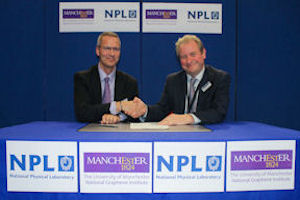Landmark partnership to further commercialisation of graphene
13 Nov 2014
The University of Manchester and National Physical Laboratory collaborate to speed up application of world’s thinnest material

The University of Manchester and The National Physical Laboratory (NPL) have signed a memorandum of understanding to help move the potential benefits of graphene closer to practical use, by accelerating the commercialisation of the remarkable 2D material.
This landmark agreement will see the two world-leading organisations work together on the development of graphene metrology, characterisation and standards vital to industry uptake, with a view to establishing a Joint Centre of Excellence. This will see the UK become a leading authority on graphene standards.
The agreement was signed at NPL’s ‘Graphene & 2-D Materials Conference’, a two day event on the 12th and 13th of November looking at how to take the material from research to real world applications, and including presentations from IBM, Nokia and the US Naval Research Laboratory.
Graphene, the world’s first 2D material, has many extraordinary properties and characteristics which are either unique or surpass those of other materials. It possesses superior mechanical stiffness, strength and elasticity, electrical and thermal conductivity. It is optically active, chemically inert and impermeable to gases.
The possession of all of these properties in a single material makes graphene a potentially disruptive technology in sectors like optoelectronics, flexible electronics, bioelectric devices, energy storage and ultrafiltration.
There are many early adopters of graphene, but without standardisation it is difficult for industry to be assured of the quality and properties of the material, and for graphene to be used to its full potential. Although achieving international standardisation is a key enabler for industry in any area, the process can take many years.
The University of Manchester and NPL are seeking to address this gap in standardisation in the meantime and accelerate the development of graphene-enabled technology through the accurate metrology and characterisation of the material to improve the understanding of the properties of graphene and the ability to produce it in a reliable and repeatable way.
Robin Hart, Director of Programmes at NPL said: “With its many amazing properties, graphene has the ability to totally transform entire industries. Consumers and manufacturers at different stages of the supply chain must be confident that they get what is written on the tin. Introduction of metrology steps in the development and production chains will dramatically improve their efficiency and ensure that the government and business investment in graphene technology is used in the most effective way.
“Manchester is widely regarded as the home of graphene R&D and by working with them in efforts to speed up the commercialisation of research, we can start to reap the benefits to industry and society that graphene can offer much sooner.”
James Baker, Business Director at the National Graphene Institute at The University of Manchester said: “With this new partnership The University of Manchester and NPL are showing joint determination to lead the way in graphene applications. Industry leaders need to be confident in the material they are dealing with. By working with academics at The University of Manchester and at the National Graphene Institute, companies can be confident in approaching graphene applications with the best possible understanding through comprehensive standards , characterisation and testing.
“The metrology expertise based at NPL, paired with the world class academics, state of the art equipment and facilities at the UoM and NGI allows for viable graphene-based products to come the marketplace sooner.”
About the National Graphene Institute:
The National Graphene Institute at The University of Manchester will be the world leading facility for graphene research when it officially opens in March 2015. Funded by the UK Government and the European Union, the £61m National Graphene Institute will allow businesses to partner with the world’s finest graphene minds. At 7,800 square metres (almost two football pitches of space), with £11m state-of-the-art equipment and labs the NGI enables academics and their industrial partners to work side-by-side on new and exciting applications. The NGI is built with high quality, fully-equipped cleanrooms, as well as an array of collaborative work areas and laboratories. The NGI will also act as the UK national centre for graphene research , drawing in specialists from across the country – making it the ideal environment for world-class research.
About the National Physical Laboratory:
The National Physical Laboratory (NPL) is the United Kingdom's national standards laboratory, an internationally respected and independent centre of excellence in research, development and knowledge transfer in measurement and materials science. Annually, it delivers over £75M of research and knowledge transfer programmes. Its resources include over 600 technical and scientific experts, spanning a wide range of disciplines; 36,000m² of laboratories and many unique facilities.
NPL works to provide the measurement capability (quantum metrology and nanoanalysis techniques) necessary to characterise the graphene produced by the various methods. This will help enable the industrialisation of graphene production and its adoption. The NPL multidisciplinary team has over 18 people and in the past 2.5 years they have published over 30 papers in high impact publications on graphene.
